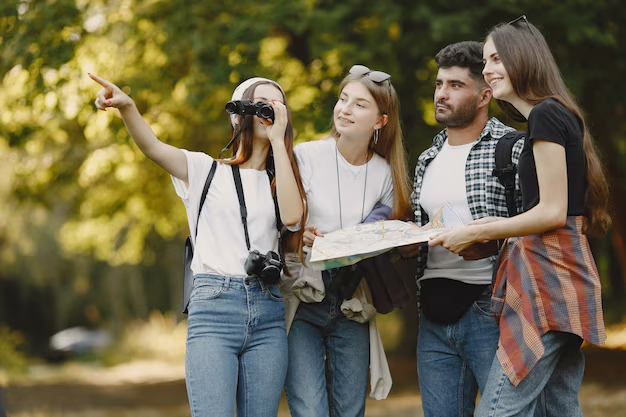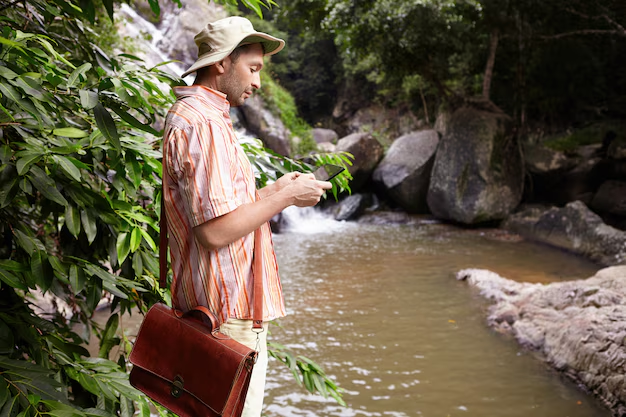In an era intersection where wanderlust often meets learning, travel has transcended its traditional role of recreation to become an essential aspect of educational enrichment. Today’s travelers, especially students, are seeking more than just relaxation or sightseeing—they want experiences that challenge their perspectives, broaden their minds, and connect them with the global community. Educational travel, which merges learning with adventure, provides an opportunity to explore the world in a way that fosters personal growth, cultural understanding, and intellectual development.
In this article, we’ll explore how travel with purpose, rooted in both education and adventure, creates a powerful synergy. By examining various types of educational travel, its benefits, and the unique opportunities it offers, we aim to inspire both students and lifelong learners to embrace the world as their classroom.
Key Takeaways
- Educational travel allows you to experience the world in a way that broadens both your intellectual and personal growth.
- Combining adventure and education helps improve knowledge retention, builds life skills, and fosters global awareness.
- Whether through study abroad programs, field studies, or volunteer work, educational travel encourages hands-on learning and cultural exchange.
- Purposeful travel creates lasting memories, enhances critical thinking, and cultivates independence and confidence.
The Rise of Educational Travel
Historically, travel has always been a means of learning—whether it was the ancient Greeks exploring the world to understand different cultures, or the age of exploration when European explorers ventured to distant lands for the sake of knowledge and discovery. In modern times, educational travel has evolved into a structured, purposeful journey that offers hands-on experiences in unique and dynamic environments.
Educational travel today is not confined to the classroom or traditional textbooks. It spans continents, cultures, and disciplines, allowing travelers of all ages to engage with the world in a meaningful way. Whether it’s studying marine biology in the Great Barrier Reef, understanding history through the ruins of ancient civilizations, or engaging with indigenous cultures in the Amazon rainforest, educational travel allows individuals to learn in ways that simply can’t be achieved through textbooks or lectures alone.
The Intersection of Education and Adventure
At the heart of educational travel lies adventure. Adventure doesn’t just refer to the physical aspect of travel, such as hiking a mountain or diving into the ocean—it also includes the intellectual, emotional, and cultural adventures that await curious minds. This intersection of education and adventure is where true learning happens.
Here’s why combining education with adventure is so powerful:
Engagement and Immersion When you’re physically immersed in a new environment, the learning process becomes far more engaging. Walking through ancient cities, exploring natural ecosystems, and engaging with local communities allows you to experience lessons firsthand. This immersion creates emotional and intellectual connections to the material being learned, making it more memorable and impactful.
Hands-On Learning Educational travel offers the unique opportunity for hands-on experiences that go beyond passive learning. Whether it’s conducting field research, participating in a conservation project, or learning a new language through direct interaction with locals, these experiences encourage deeper understanding and mastery.
Personal Growth Adventure, in the context of educational travel, often pushes travelers outside their comfort zones, promoting self-discovery, resilience, and adaptability. These life skills are just as important as the knowledge gained, equipping individuals with the tools needed for personal and professional growth.
Cultural Understanding Traveling with purpose often involves cultural exchange, which plays a significant role in fostering global awareness and empathy. By experiencing different cultures, travelers gain insight into different ways of life, perspectives, and worldviews, which in turn helps break down stereotypes and biases.
Popular Types of Educational Travel Adventures

There are countless ways in which education and adventure can intersect through travel. Here are a few examples of educational travel experiences that combine learning and adventure:
Study Abroad Programs
Study abroad programs are among the most popular forms of educational travel. They allow students to immerse themselves in another culture while pursuing academic courses or language studies. Whether it’s spending a semester in Italy, learning about history in Greece, or studying environmental science in Costa Rica, study abroad programs offer unique opportunities to expand knowledge outside the classroom.
Adventure Learning and Field Studies
Many educational programs combine adventure activities with learning experiences. For instance, marine biology students may travel to coastal regions to study marine ecosystems and conservation efforts, while geology students might travel to volcanic regions to learn about plate tectonics and rock formations. These field studies blend the thrill of exploration with educational objectives.
Volunteering and Service Learning
Many educational travel opportunities involve volunteer work or service learning. Programs like Habitat for Humanity, environmental conservation, and teaching English abroad offer an enriching combination of travel, service, and learning. Volunteers not only help local communities but also gain first-hand insight into global issues, from poverty to climate change.
Cultural Immersion and Language Learning
Cultural immersion programs allow travelers to live with local families or in communities to fully understand a foreign culture. Language immersion programs, often found in countries like Spain, France, and Japan, are highly beneficial for learning new languages through everyday interactions. These programs create adventure through unfamiliar territory while fostering significant personal and intellectual growth.
Eco-Tourism and Sustainable Travel

Eco-tourism focuses on sustainable travel experiences that have minimal impact on the environment while offering rich educational content. Travelers might explore biodiversity hotspots like the Amazon rainforest, the Galapagos Islands, or Africa’s Serengeti. These trips often come with expert guides who provide invaluable information about conservation efforts, wildlife protection, and sustainable practices.
Historical and Archaeological Tours
Educational travel offers opportunities to visit historically significant sites, from the pyramids in Egypt to the ancient ruins of Machu Picchu in Peru. Archaeological tours provide hands-on learning experiences where travelers can explore the rich cultural and historical heritage of a region, often with scholars or experts guiding the way.
Adventure Sports and Skill-Based Learning
Adventure sports like rock climbing, scuba diving, and kayaking offer not only thrilling experiences but also valuable learning opportunities. For instance, diving in the Great Barrier Reef allows students to learn about marine life conservation, while rock climbing teaches physical endurance and problem-solving skills in a real-world setting.
The Benefits of Educational Travel with Purpose
Educational travel offers a multitude of benefits, not only in terms of knowledge gained but also in fostering personal and professional growth. Here are some of the key advantages:
Deepens Knowledge and Retention
Studies have shown that experiential learning, such as travel, enhances knowledge retention compared to traditional classroom learning. Engaging all the senses while learning about history, culture, or science makes it easier for information to stick.
Fosters Critical Thinking
Travelers are often confronted with new challenges, unfamiliar environments, and different cultural norms. These experiences encourage problem-solving and critical thinking, which are essential skills for both academic and professional success.
Builds Confidence and Independence
Being in a new country or situation often requires travelers to rely on their problem-solving abilities, adaptability, and independence. These experiences boost self-confidence and promote resilience in overcoming obstacles.
Develops Global Awareness
Educational travel helps develop a global perspective. As travelers engage with different cultures, they gain insight into global issues, from climate change to social justice, and are inspired to take action.
Creates Lasting Memories
Travel is an unforgettable experience. The memories created during educational trips are often among the most cherished, as they represent not only intellectual growth but also adventure, discovery, and personal connection.
How Educational Journeys Can Enrich Your Life
In today’s globalized world, the way we learn has evolved far beyond the traditional classroom. Education is no longer confined to books, lectures, or exams; it has become a more holistic and dynamic experience that stretches beyond borders. One of the most enriching ways to engage with education is through educational journeys—experiential learning opportunities that allow individuals to explore the world while gaining practical, real-world knowledge.
Whether it’s an international study program, a cultural exchange, a hands-on field research expedition, or a volunteering experience, educational journeys can dramatically enrich your life by offering transformative experiences that shape not only your knowledge but also your worldview. These journeys do more than just educate; they immerse you in new environments, broaden your horizons, and challenge you to think critically about the world around you.
What Is an Educational Journey?
An educational journey is any travel experience that combines learning with exploration. This type of journey often focuses on gaining deeper knowledge about a particular subject—be it history, science, culture, or social issues—while being immersed in real-world contexts. Instead of just reading about a culture or studying a historical event in the classroom, educational journeys provide the opportunity to experience it firsthand.
These trips can be short-term, like a field trip or an internship abroad, or they can last months or even years, as in the case of study abroad programs. The goal is to create a learning experience that connects theoretical knowledge with the realities of the world.
How Educational Journeys Enrich Your Life
Expanding Knowledge Beyond the Classroom
Traditional education—while effective—often lacks the ability to connect concepts with real-world experiences. Educational journeys bridge this gap by providing hands-on learning that is immediate, engaging, and impactful. Whether you are studying marine biology in the Caribbean or learning history by walking through the ruins of ancient Greece, these experiences allow you to engage with the subject matter in a way that deepens your understanding.
In contrast to simply memorizing facts or theories, you begin to truly experience the world in all its complexity, making the lessons you learn more memorable and meaningful.
Personal Growth and Self-Discovery

Travel has a unique way of pushing you out of your comfort zone, often leading to profound personal growth. Educational journeys encourage you to step into unfamiliar environments and challenge preconceived notions about culture, geography, and history. The process of learning in new and diverse contexts often results in greater self-awareness, increased adaptability, and enhanced problem-solving skills.
You may find yourself navigating new languages, customs, or even learning how to work in a completely different cultural context. These experiences shape who you are as a person, fostering greater independence, resilience, and confidence.
Developing Global Awareness and Cultural Competence
In a world that is becoming increasingly interconnected, understanding and respecting cultural differences is essential. Educational journeys provide an immersive way to develop global awareness—an understanding of the diverse world we live in. By engaging directly with different cultures, you not only gain knowledge about the customs, beliefs, and values of other people but also develop empathy and tolerance.
For example, studying environmental science in the Amazon Rainforest provides a deeper understanding of the interdependencies between humans and nature, while volunteering in underprivileged communities can give insight into the economic and social challenges many face. These experiences help shape individuals who are not only more informed but also more compassionate and socially responsible.
Broadening Perspectives and Expanding Worldviews
One of the most valuable aspects of educational travel is its ability to broaden your perspective on life. When you step into a new environment, you see the world through different eyes. This shift in perspective allows you to reframe your understanding of global issues, human behavior, and cultural diversity.
For example, a student studying anthropology who spends time with indigenous communities in the Andes Mountains may see the world differently in terms of social structures and traditions. This broadening of perspective helps foster open-mindedness, creativity, and critical thinking—skills that are crucial in today’s rapidly changing world.
Networking and Career Opportunities
Educational journeys provide opportunities to network and form valuable connections. Whether you’re participating in a study abroad program, working on an international research project, or volunteering with a global NGO, these experiences allow you to meet people from diverse backgrounds, including fellow students, professionals, and local experts.
These connections can have lasting benefits, both personally and professionally. Many individuals find career opportunities through internships or mentorships they gain during educational travel experiences. The skills you acquire—such as cross-cultural communication, international collaboration, and global leadership—are highly valued in today’s job market, making educational journeys a valuable investment in your future.
Cultivating Passion and Lifelong Learning
There’s something inherently energizing about learning in a way that is connected to your passions. When you travel to study a subject that excites you—whether it’s art history in Paris, marine conservation in Fiji, or archaeology in Egypt—you deepen not only your knowledge but also your love for the subject. This passion for learning carries with you long after the journey ends.
The more you travel and learn, the more you realize how much there is still to discover. Educational journeys ignite a love for lifelong learning, fueling curiosity and intellectual growth for years to come.
Promoting a Sense of Purpose
Educational journeys often have a clear sense of purpose—whether it’s a desire to make a difference through volunteer work or an academic pursuit in a specialized field. This sense of purpose drives individuals to make the most of their travel experiences, turning them into something more than just a vacation or leisure activity. When you travel with the intention of learning and growing, the experience becomes deeply meaningful and fulfilling.
For example, traveling to work on a community development project can give you a profound sense of purpose, knowing that your efforts are contributing to improving someone’s life. Similarly, studying at historical sites like the Great Wall of China or the Colosseum provides a deeper appreciation for the preservation of heritage and the lessons history can teach us.
Also Read: What Are the Key Trends Shaping the Geo Travel Industry?
Conclusion
Travel with purpose—where education and adventure intersect—offers unique opportunities for personal and intellectual growth. Whether it’s learning about new cultures, conducting field research, or volunteering abroad, the world provides an endless classroom for those who are curious and eager to learn. By combining education with adventure, we not only explore new destinations but also enrich our minds, expand our horizons, and create lasting memories.
FAQs
What is educational travel?
Educational travel involves traveling to gain knowledge, whether it’s through academic study, cultural immersion, fieldwork, or service-based learning. The goal is to learn through experience rather than just textbooks.
How can educational travel benefit students?
Educational travel enhances learning by offering real-world experiences. It promotes cultural awareness, critical thinking, independence, and personal growth, providing a more immersive and enriching learning experience.
Are there any age limits for educational travel?
Educational travel is beneficial for all ages, from school-aged children to adults. Many programs cater specifically to different age groups and educational levels.
What are some examples of educational travel experiences?
Examples include study abroad programs, cultural exchange, volunteer service trips, language immersion, eco-tourism, and field study programs focused on topics like history, biology, and sustainability.
How do I plan an educational travel trip?
Research programs offered by universities, educational organizations, or travel agencies. Consider factors like destination, learning objectives, duration, and cost. Planning should also include accommodations, travel insurance, and necessary travel documents.
Can educational travel be affordable?
Yes, many educational travel programs offer scholarships, grants, or financial assistance. Additionally, group programs or volunteer opportunities can be more affordable than traditional vacations.
How does educational travel impact my career?
Educational travel helps develop valuable skills such as problem-solving, cultural competency, adaptability, and global awareness. These skills are highly valued in today’s interconnected world and can enhance career prospects.
